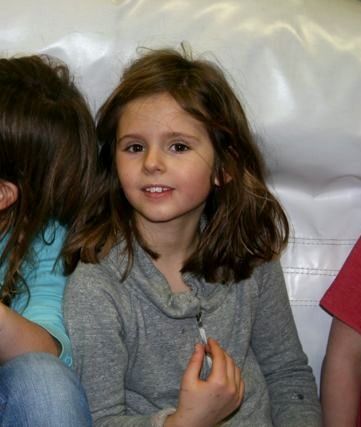
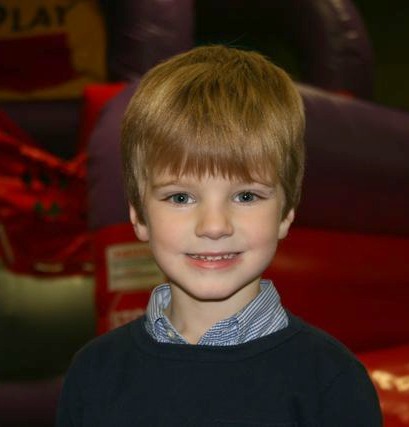
Everyday life is a practice and a poem.
These words came to me on Friday in a yoga class. My first yoga class in more months than I can count. My body remembered the poses like some deeply known but forgotten language. My mind ran and ran, occasionally settling into a thought, and this one came back, over and over: every day life is both practice and poem.
A practice and a poem.
Dinner with two old, dear friends. Drive home in the icy darkness. Say goodbye to Matt as he leaves for a weekend with his father and brothers. Refill three heavy humidifiers, lug them up flights of stairs, watch the steady stream of moisture puffing into the darkness of the childrens’ rooms.
Kiss Grace and Whit good night. Linger over my newly-minted six year old, his face more chiseled and boy-like every day, all traces of babyhood now gone.
Saturday morning, get the children dressed, go to Starbucks, the drycleaner, the grocery store. Drop the groceries off at home. Slip on the icy snow bank that lines the sidewalk as I try to bring bags of groceries into the house, the kids still in the car, the exhaust pipe billowing white into the crystalline, cold air. Stop. Breathe.
Drive to Whit’s birthday party. Unload drinks, birthday cake, camera. Several trips from car to Jump On In. Grace whines because she wants a chocolate bar from the vending machine and I say no. One of the other boys at the party’s father buys him a chocolate bar. I still say no. She threatens tears, crosses her arms across her chest, glares at me, stomps her foot. I shake my head. Stop. Breathe.
25 boys run wild in a paradise of indoor blow-up jumpy castles. Grace’s finger gets slammed and she cries, this time for real. We awkwardly wrap and ice pack around it and watch the finger swell. I wonder if the afternoon will hold another ER visit. Stop. Breathe.
Grace asks me to go down the tallest blow up slide with her. I agree and climb up, clumsy on the unsteady inflated steps. Grace holds her ice pack in one hand and my hand in the other. We fly to the bottom, laughing, laughing.
Drive home. The sky, which was cornflower blue when we arrived at the birthday party, is beginning to fade to pale gray, that winter whiteness that holds everything and nothing in its color.
I carry several loads of bags of presents into the house. Do I ever arrive anywhere without a car trunk full of things that need unloading, unpacking, putting-into-place? Whit pounces on the pile of presents and begins to rip into one. I raise my voice, “Stop! Wait for me to get in here!” He slinks into the couch to sit and wait, chastised. Finally, with pad of paper and pen in hand to record the gifts for thank you notes, I let him loose on the bright pile of boxes.
I fill the recycling bin with wrapping paper, wondering how I will fit in all of the boxes and plastic that the toys will shed once actually opened. When I open the lid of the recycling bin a cascade of snow falls down my front, and my wrists are suddenly freezing. I’m wearing a pair of Matt’s sneakers, untied, because they were by the door, and I can feel cold wetness around my heels. The children are shouting about something just inside the door. I close my eyes for a minute, inhale, my foot poised above the top step. Sometimes the work of this life is so daunting. Breathe.
The children watch the Nancy Drew movie. I put in a load of laundry and sit down at my desk to upload the pictures from the party. After several minutes I look in on them, sitting close to each other on the couch, and feel a tidal wave of love break over me. They both sense me staring and look at me, and two faces split into happy smiles. I return a smile, through tears.
A practice and a poem.

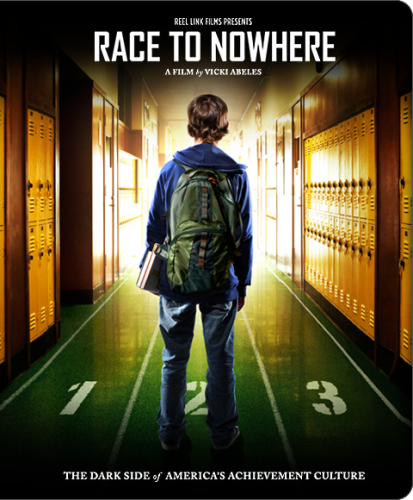
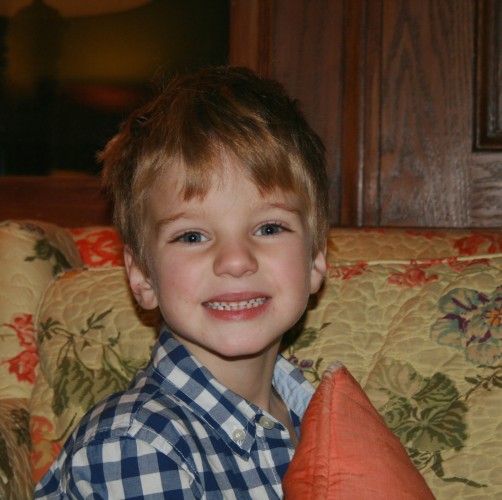
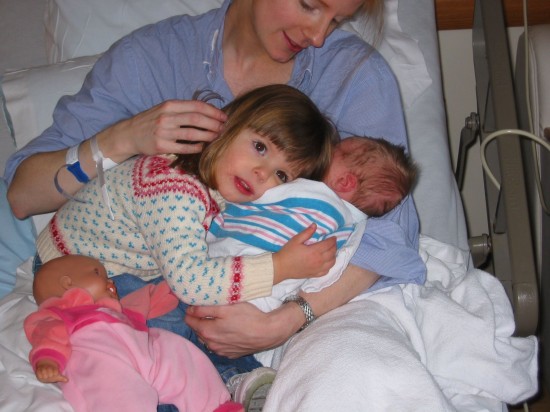 From the very beginning, we all adored you. This photograph of the first time Grace met you reminds me of William Blake’s famous line that “we are here to learn to endure the beams of love.” You’ve been loved, fiercely, every single minute of your life. Your father wept when you were born, taken aback by the intensity of his reaction, never having acknowledged to himself how much he wanted to have a son. Your sister was passionately attached from the first minute; one of my early memories is of her coming in the front door, being handed her favorite doll to play with, and wailing, “But I want to play with the REAL BABY!” And me, well, I fell in love with you from the first moment I saw you. With you I enjoyed, for the first and only time in my life, that blissful bonding with a newborn. Thank you for giving me that experience, for showing me that it wasn’t out of my reach, that I could, in fact, be overwhelmed by the instinct to mother. Maybe I could do this after all.
From the very beginning, we all adored you. This photograph of the first time Grace met you reminds me of William Blake’s famous line that “we are here to learn to endure the beams of love.” You’ve been loved, fiercely, every single minute of your life. Your father wept when you were born, taken aback by the intensity of his reaction, never having acknowledged to himself how much he wanted to have a son. Your sister was passionately attached from the first minute; one of my early memories is of her coming in the front door, being handed her favorite doll to play with, and wailing, “But I want to play with the REAL BABY!” And me, well, I fell in love with you from the first moment I saw you. With you I enjoyed, for the first and only time in my life, that blissful bonding with a newborn. Thank you for giving me that experience, for showing me that it wasn’t out of my reach, that I could, in fact, be overwhelmed by the instinct to mother. Maybe I could do this after all.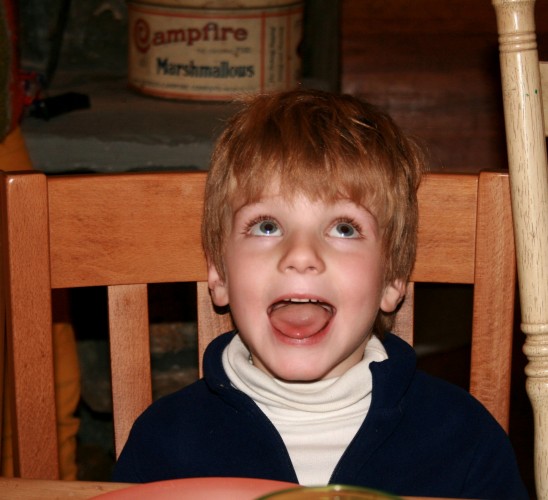
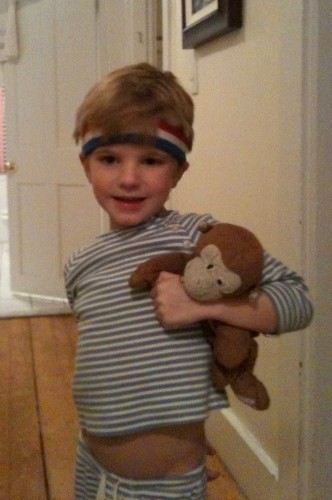
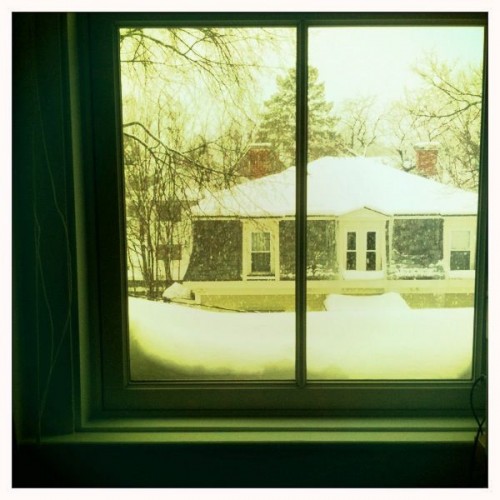 I have been thinking for days about writing a post about snow, and, lo and behold, it’s snowing again! It’s so great with the universe comes through like that. Of course, it’s been snowing almost non-stop since December 26th, so possibly it’s a coincidence. When I look out my office window, whose
I have been thinking for days about writing a post about snow, and, lo and behold, it’s snowing again! It’s so great with the universe comes through like that. Of course, it’s been snowing almost non-stop since December 26th, so possibly it’s a coincidence. When I look out my office window, whose